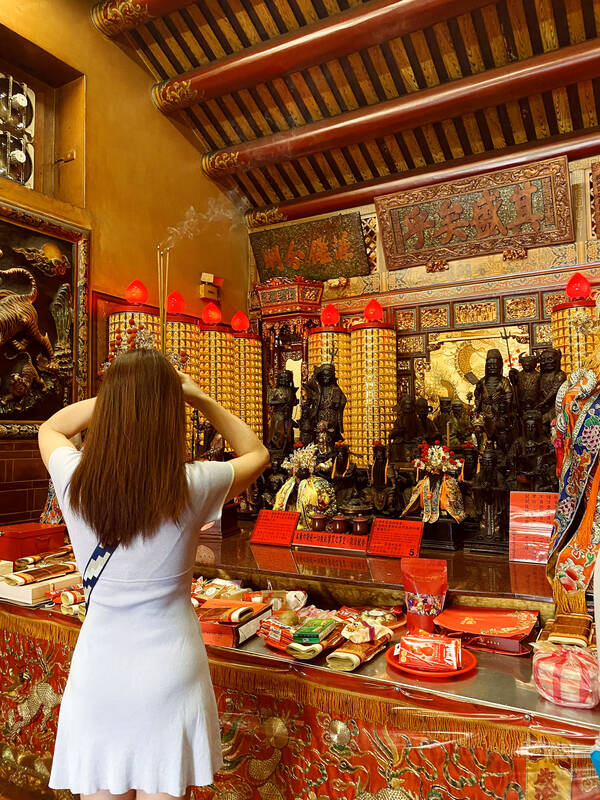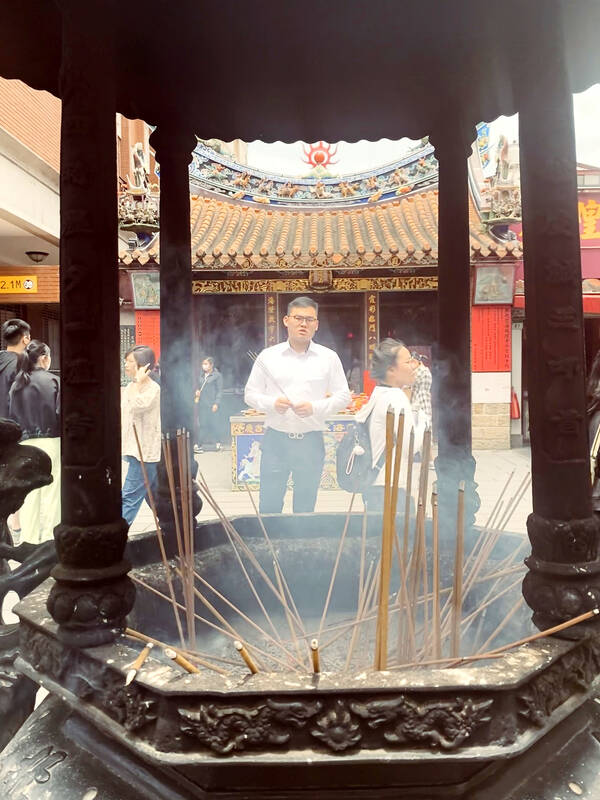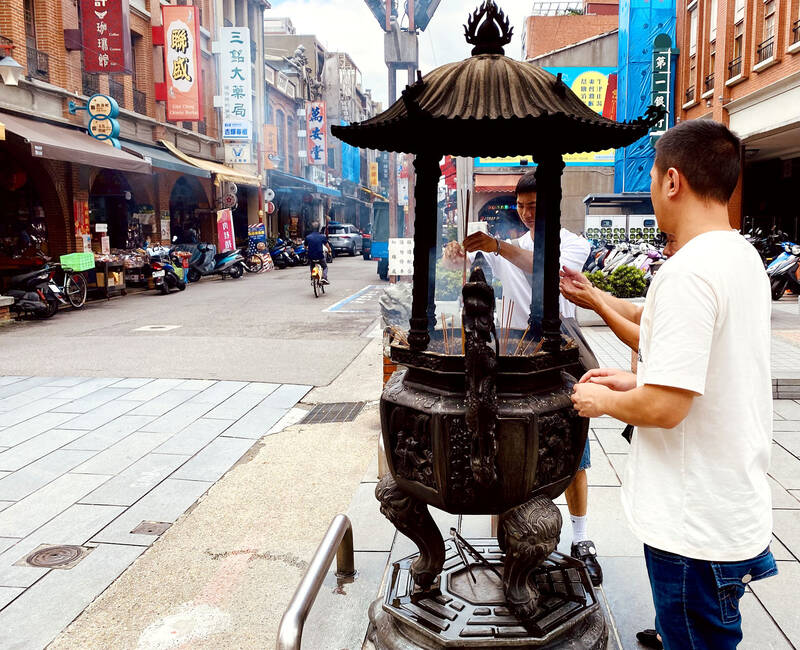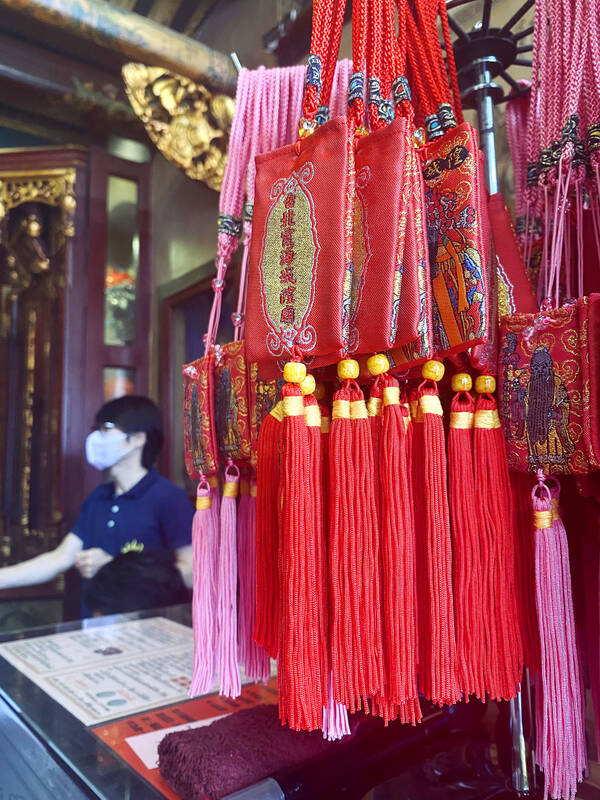Shauna Persse has been unlucky in love. She’s tried Tarot cards, horoscopes and rose quartz crystals, yet continues to look for the girl of her dreams. So when she hears of Taipei’s Xia Hai City God Temple (霞海城隍廟), she decides to take a leap of faith.
Outside the matchmaking temple, a group of devout worshippers are enveloped in a thick smog of incense, prayers writ on furrowed brows. She steps over the mahogany threshold into the temple’s darkened sanctuary and approaches the counter.
“[Are you] looking for a partner?” asks a welcoming and intrigued temple worker.

Photo: Hollie Younger
A partner? Not a boyfriend? Not a husband? . . . how positively progressive.
Here, the matchmaking deity The Old Man Under the Moon (月下老人), affectionately known as Yue Lao (月老), has been connecting fated lovers with his fabled red string since 1859.
Straight or gay, foreigner or local, Daoist or not, single or taken, all are welcome here to ask for heavenly help with matters of the heart — a centuries-old tradition aiding in modern dating.

Photo: Hollie Younger
DIVINE DIVERSITY
Persse, 29, is an Irish girl now living in Melbourne, Australia. She hopes to return from vacation in Taiwan to find her dream woman.
Having worked at the temple for many years, English-speaking guide Chang Chih-yang (張志揚), 36, says temple staff never question or presume which partner patrons are praying for — that’s between them and the Gods, who are also LGBTQ+ allies.

Photo: Hollie Younger
“Taiwanese deities aren’t concerned with such matters,” he says.
He tells us that each year 6,000 matches are made at this temple. But with such heavy foot traffic, thousands of matches aren’t unusual — though he quips that he’s here every day and he’s still single.
Chang says that couples on the rocks also come here for help. Husband got a bit on the side? Come pray away that pesky mistress. Waited too long for them to pop the question? Lao Yue will get them to put a ring on it.

Photo: Hollie Younger
He says Japanese, Malaysians and Singaporeans all come here seeking love.
And Westerners?
Chang pauses. Many come to look, but few pray, he muses, perhaps because they have different religious beliefs. Or maybe, as I experienced, it’s not well advertised. I confess I felt unsure if foreigners could join in.
He’s amused by this — of course they’re welcome to pray too.
PRAYER PROCEDURE
NT$400 later, Persse is set up with the love-seeker’s holy trinity: a bundle of paper money to burn as offerings for the Gods, three joss sticks and a pink tasseled amulet that fits in the palm of her hand.
Step one, she lights her joss sticks and approaches the incense burner at the entrance.
She introduces herself to the Jade Emperor, a deity that presides over all temples in Taiwan. To avoid any mix-ups, she gives her full name, address, date and time of birth — I’m certain there aren’t many Shauna Persses in Taipei right now, but it doesn’t hurt to be sure.
She enters the main hall that’s more of a cozy nook. Red lanterns atop golden pillars cast a warm glow over exposed dark wood beams, a priest recites a low and melancholic chant from an open prayer book, and before an impressive array of statues stand rows of pious worshippers.
Persse then greets the love god, Lao Yue. His smaller stature sits modestly in the front row, yet he boasts piles of offerings, from Strawberry Pocky sticks to Ferrero Roche chocolates.
Next step, she describes her type and exactly what she’s looking for. The more specific the better.
Nearby, two women recite lengthy checklists from their iPhones. Chang explains worshippers can request how tall, how hunky and how much they make in a month.
As the meme goes: looking for a man in finance, trust fund, 6’5 (196cm), blue eyes? Or a la Persse, seeking a Melbourne-based slightly-taller-than-you yet slightly-younger-than-you lesbian?
Patrons can also list their red flags. Chang tells us some girls say “if I have to move in with his parents, that’s a dealbreaker.”
For Persse, “I asked for a girl who was honest, with a 9-5 job that helps people” — liars and shift-working bartenders need not apply.
She gives Lao Yue a bow and heads outside.
Finally, Persse deposits her joss sticks back at the incense burner, circles her amulet clockwise three times through the incense smoke and donates her paper money for ceremonial burning. Then it’s time to sit back with a complimentary tea and wait to be swept off her feet.
If the temple answers prayers and perfect partners materialize, custom dictates patrons return and give thanks. On the offerings table, gift boxes of fancier confectionery sit proudly among Kinder Bueno multipacks. These, Chang says, are gifts from married couples who, like Persse, prayed in this very temple.
HEAVEN-SENT TO HINGE
Persse soon returns home to Melbourne. The small pink amulet will remain tucked inside her purse, working its magic until she finds the one.
Two weeks later word arrives from Australia that she’s swiped right on a girl that seems to tick all the boxes. They have a first date this weekend. Crikey, Tinder works hard, but the Gods work harder.
Persse says her dating app Hinge has been lighting up.
“All up I think the universe is sending more women my way. I’ve definitely got a lot more attention since getting my little charm.”
Could it be divine intervention? Only time will tell.

In the March 9 edition of the Taipei Times a piece by Ninon Godefroy ran with the headine “The quiet, gentle rhythm of Taiwan.” It started with the line “Taiwan is a small, humble place. There is no Eiffel Tower, no pyramids — no singular attraction that draws the world’s attention.” I laughed out loud at that. This was out of no disrespect for the author or the piece, which made some interesting analogies and good points about how both Din Tai Fung’s and Taiwan Semiconductor Manufacturing Co’s (TSMC, 台積電) meticulous attention to detail and quality are not quite up to

April 21 to April 27 Hsieh Er’s (謝娥) political fortunes were rising fast after she got out of jail and joined the Chinese Nationalist Party (KMT) in December 1945. Not only did she hold key positions in various committees, she was elected the only woman on the Taipei City Council and headed to Nanjing in 1946 as the sole Taiwanese female representative to the National Constituent Assembly. With the support of first lady Soong May-ling (宋美齡), she started the Taipei Women’s Association and Taiwan Provincial Women’s Association, where she

It is one of the more remarkable facts of Taiwan history that it was never occupied or claimed by any of the numerous kingdoms of southern China — Han or otherwise — that lay just across the water from it. None of their brilliant ministers ever discovered that Taiwan was a “core interest” of the state whose annexation was “inevitable.” As Paul Kua notes in an excellent monograph laying out how the Portuguese gave Taiwan the name “Formosa,” the first Europeans to express an interest in occupying Taiwan were the Spanish. Tonio Andrade in his seminal work, How Taiwan Became Chinese,

Mongolian influencer Anudari Daarya looks effortlessly glamorous and carefree in her social media posts — but the classically trained pianist’s road to acceptance as a transgender artist has been anything but easy. She is one of a growing number of Mongolian LGBTQ youth challenging stereotypes and fighting for acceptance through media representation in the socially conservative country. LGBTQ Mongolians often hide their identities from their employers and colleagues for fear of discrimination, with a survey by the non-profit LGBT Centre Mongolia showing that only 20 percent of people felt comfortable coming out at work. Daarya, 25, said she has faced discrimination since she